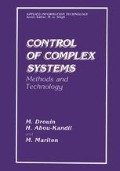Abstract
The concept and practical considerations concerning partial feedback control laws were explained in the preceding chapters. During this discussion the importance of the feedback loop was emphasized. The purpose of this chapter is to present a method to optimize the role of the feedback part in a mixed control law. After a brief introduction to formulate the problem, it is shown that the direct decomposition-coordination approach presented earlier leads, quite naturally, to a near-optimal total feedback control structure. This provides a method for solving control problems under structural constraints. Several examples are given to illustrate the proposed procedure and a large part of this chapter is dedicated to applications.
Access this chapter
Tax calculation will be finalised at checkout
Purchases are for personal use only
Preview
Unable to display preview. Download preview PDF.
References
Bingulac S.P., Cuk N.M., Calovic M.S., Calculation of optimum feedback gains for output constrained regulators, IEEE Trans. Aut. Control, Vol. AC-20; pp. 164–166, 1975.
Choi S.S. and Sirisena, H.R., Computation of optimal output feedback gains for output constrained regulators, IEEE Trans. Aut. Control, Vol. AC-19, pp. 257–258, 1974.
Cohen, A min-max approach to closed loop decentralized optimal control, Ricerche di Automatica, Vol. 8, pp. 86–106, 1977.
Darwish, M., Contribution à l’étude de la stabilité et de la commande des systèmes dynamiques complexes et application aux réseaux d’énergie électrique, Thèse de Doctorat d’Etat, Université Paul Sabatier, Toulouse, 1977.
Ermer and Vandelinde, Output feedback gains for a linear discrete stochastic control problems, IEEE Trans. Automatic Control, Vol. 18, pp. 154–157, 1973.
Horisberger and Bellanger, Solution of the optimal constant ouput feedback problem by conjugate gradients, IEEE Trans. Automatic Control, Vol. 19, pp. 434–435, 1974.
Iyer S.N. and Cory B.J., Optimum control of a turbo-generator including an exciter and governor, IEEE Conference proceedings. Society winter power meeting. Jan. Feb. 1971.
Iyer S.N. and Cory B.J., Optimization of a turbo-generator transient performance by differential programming, IEEE Conference proceedings. Society winter power meeting Jan/Feb. 1971.
Levine W.S. and Athans M., On the determination of the optimal constant output feedback gains for linear multivariable systems, IEEE Trans. Aut. Control, Vol. AC-15, pp. 44–48. 1970.
Medanic J., Petranovic D. and Gluhajic N., The design of output regulators for discrete-time linear systems by projective control, Int. J. Control, Vol. 41, pp. 615–639. 1985.
Moussa H. and Yu Y.N., Optimal power system stabilization through excitation and governor control, IEEE Trans. Power Systems, Vol. PAS-90, pp. 1166–1174, 1972.
Mukhopadhyay B.K. and Malik O.P., Optimal control of synchronous machine excitation by quasi-linearisation technique, Proc. LEE, Vol. 119, 1972.
Mukhopadhyay B.K. and Malik O.P., Solution of non-linear optimization problems in power systems, Int. J. Control, Vol. 17, n° 5, pp. 1041–1058, 1973.
Rao R.G. and Ahson A.I., Control of interconnected power systems using two level methods, Int. J. Control, Vol. 34, n° 6, pp. 1195–1205, 1981.
Singh M.G., Hassan M.F., Titli A., Multi-level feedback control for interconnected systems using the prediction principle, IEEE Trans. Systems Man Cyber., Vol. SMC-60, pp. 233–239, April 1976.
Singh M.G. and Hassan M.F., Hierarchical successive approximation algorithms for nonlinear system, Large Scale Systems, Part I and I I, Vol. 2, 1981.
Singh M.G., Dynamical hierarchical control, North Holland, 1977.
Soliman H., Darwish M, Fantin J., Stabilization of large scale power systems, Int, J. Systems Sc., Vol. 9, n° 10, pp. 1091–1171, 1981.
Yu Y.N. et al., Application of an optimal control theory to a power system, Trans. IEEE Power Systems, Vol. PAS.89, n° 1, pp. 55–62, 1970.
Author information
Authors and Affiliations
Rights and permissions
Copyright information
© 1991 Springer Science+Business Media New York
About this chapter
Cite this chapter
Drouin, M., Abou-Kandil, H., Mariton, M. (1991). Optimization of the Feedback Loop. In: Control of Complex Systems. Applied Information Technology. Springer, Boston, MA. https://doi.org/10.1007/978-1-4757-9853-1_5
Download citation
DOI: https://doi.org/10.1007/978-1-4757-9853-1_5
Publisher Name: Springer, Boston, MA
Print ISBN: 978-1-4757-9855-5
Online ISBN: 978-1-4757-9853-1
eBook Packages: Springer Book Archive

